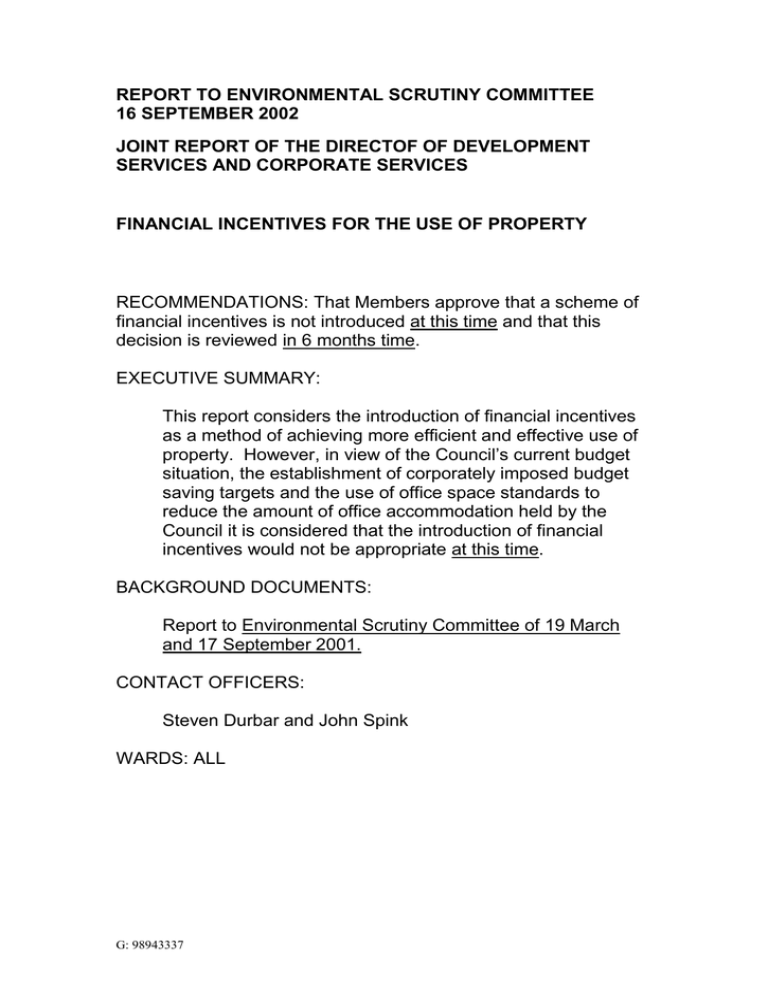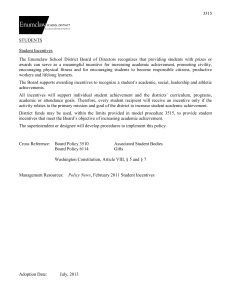REPORT TO ENVIRONMENTAL SCRUTINY COMMITTEE 16 SEPTEMBER 2002
advertisement

REPORT TO ENVIRONMENTAL SCRUTINY COMMITTEE 16 SEPTEMBER 2002 JOINT REPORT OF THE DIRECTOF OF DEVELOPMENT SERVICES AND CORPORATE SERVICES FINANCIAL INCENTIVES FOR THE USE OF PROPERTY RECOMMENDATIONS: That Members approve that a scheme of financial incentives is not introduced at this time and that this decision is reviewed in 6 months time. EXECUTIVE SUMMARY: This report considers the introduction of financial incentives as a method of achieving more efficient and effective use of property. However, in view of the Council’s current budget situation, the establishment of corporately imposed budget saving targets and the use of office space standards to reduce the amount of office accommodation held by the Council it is considered that the introduction of financial incentives would not be appropriate at this time. BACKGROUND DOCUMENTS: Report to Environmental Scrutiny Committee of 19 March and 17 September 2001. CONTACT OFFICERS: Steven Durbar and John Spink WARDS: ALL G: 98943337 KEY COUNCIL POLICIES: Budget Strategy Surplus Property Policy 1.0 INTRODUCTION 1.1 In September 2001 Committee received a report on the introduction of financial incentives for the effective and efficient use of property. 1.2 Due to the Council’s financial position, which would not allow such flexibilities to be built into its budget strategy, it was agreed that incentives should not be introduced but that the situation be reviewed in one year’s time. 1.3 The potential incentives would be directorates retaining running costs savings within their budgets and directorates receiving a percentage of capital receipts from the sale of surplus assets. 2.0 COMMENT 2.1 Incentives are very useful to encourage the efficient and effective use of property. They are particularly relevant in all buildings where space standards are not being used to drive improvement, ie, all buildings other than offices. 2.2 However, the Council’s current financial situation still means that running cost savings need to be used to achieve the defined corporate cost savings targets rather than taken by individual Directorates to support their own service savings targets and similarly, all capital receipts need to be used to achieve the corporate targets for capital generation which is required to support the current capital programme and revenue budget. 2.3 It should also be noted that the implementation of the office accommodation strategy and the progress in achieving space standards is improving the efficiency and effectiveness of the use of office accommodation. G: 98943337 3.0. BUDGET STRATEGY 3.1. The budget strategy for 2003/04 is currently under consideration by Cabinet, including means of introducing more flexibility into budget management and incentives to promote efficiency. 3.2. The current RSG system is being reviewed by Government with signs that there could be an intent to shift resource to areas like Salford with greater need. 3.3. Should Salford receive a beneficial settlement, this would help to bring about the greater flexibility of budget management it is seeking to develop and would provide the opportunity to consider the implementation of financial incentives for the use of property. 4.0. CONCLUSION 4.1. It is considered that financial incentives should not be introduced at this time but that this matter should again be subject to review in 6 month’s time. MALCOLM SYKES ALAN WESTWOOD Director Of Development Services Director of Corporate Services G: 98943337


